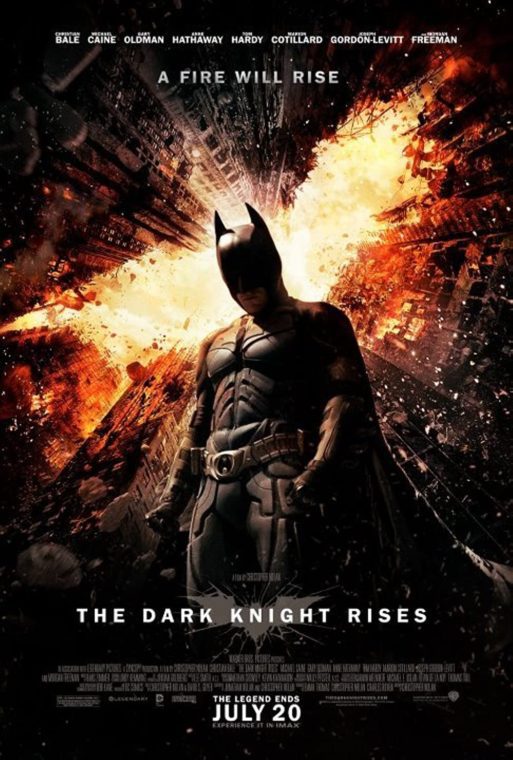 Well, it had to come to an end eventually. Nothing lasts forever, and, indeed, when it comes to super hero movie series, that might not be such a bad thing. If we are to believe the trailers and the media, The Dark Knight Rises is to be the concluding chapter Christopher Nolan’s wildly successful re-boot of the Batman franchise, and he has sent off the Dark Crusader in fine style, even if not quite as fine as the prior films. While, by this reviewer’s reckoning, The Dark Knight Rises is the weakest of the three films, its villains have never been more complex, its Bruce Wayne never more tortured and Batman never confronted with so daunting a challenge. Since the conclusion of the final film, when Batman took the fall for the crimes of hero-turned-madman Harvey Dent (a.k.a., Two Face) and disappeared, Batman has become one of Gotham’s most wanted. Bruce Wayne, mourning the death of his childhood heartthrob, Rachel Dawes, has become a Howard Hughes-style recluse, and, while organized crime on the streets of Gotham has been all but defeated, the underlying corruption of this troubled city remains unshaken. Class tensions are high (especially so for a Hollywood movie). Wayne Enterprises, one of the few remaining bastions of upright high society, is on the brink of financial collapse, while one particularly ruthless board member is maneuvering for take-over by any means necessary. The memory of Harvey Dent’s twisted end sets the mood for this film’s opening, and the downcast pallor of Bruce Wayne and Chief Gordon, the only two who know the truth, that the celebrated former DA was not enough to stop the Joker. Gotham’s protectors are, therefore, emotionally ill-prepared for the explosive arrival of their newest threat: the muscle-bound, mask-wearing Bane, with an army crazies at his back, and a blood thirsty popular revolt of sorts in the making.
Well, it had to come to an end eventually. Nothing lasts forever, and, indeed, when it comes to super hero movie series, that might not be such a bad thing. If we are to believe the trailers and the media, The Dark Knight Rises is to be the concluding chapter Christopher Nolan’s wildly successful re-boot of the Batman franchise, and he has sent off the Dark Crusader in fine style, even if not quite as fine as the prior films. While, by this reviewer’s reckoning, The Dark Knight Rises is the weakest of the three films, its villains have never been more complex, its Bruce Wayne never more tortured and Batman never confronted with so daunting a challenge. Since the conclusion of the final film, when Batman took the fall for the crimes of hero-turned-madman Harvey Dent (a.k.a., Two Face) and disappeared, Batman has become one of Gotham’s most wanted. Bruce Wayne, mourning the death of his childhood heartthrob, Rachel Dawes, has become a Howard Hughes-style recluse, and, while organized crime on the streets of Gotham has been all but defeated, the underlying corruption of this troubled city remains unshaken. Class tensions are high (especially so for a Hollywood movie). Wayne Enterprises, one of the few remaining bastions of upright high society, is on the brink of financial collapse, while one particularly ruthless board member is maneuvering for take-over by any means necessary. The memory of Harvey Dent’s twisted end sets the mood for this film’s opening, and the downcast pallor of Bruce Wayne and Chief Gordon, the only two who know the truth, that the celebrated former DA was not enough to stop the Joker. Gotham’s protectors are, therefore, emotionally ill-prepared for the explosive arrival of their newest threat: the muscle-bound, mask-wearing Bane, with an army crazies at his back, and a blood thirsty popular revolt of sorts in the making.
A recurring theme in the first of the series, Batman Begins, was the necessity of confronting one’s fears. In The Dark Knight, Bruce does battle with the Joker, a self-described agent of chaos. In The Dark Knight Rises, Bane is the class warrior to the Joker’s terrorist (though Chris Hardy is no Heath Ledger, not by a long shot). Many of Bane’s flunkies look suspiciously similar to the very people that Batman has tried so hard to protect. Selina Kyle, or Cat Woman, plays an interesting role — a cat burglar who robs Wayne early on, and is the first to introduce him to the class tensions to which he has long seemed so bafflingly unaware, she allies with him, double-crosses him, and delivers a host of pretty nice one-liners along the way. The good guys have never been more confused, and the bad guys have never been harder to spot, though, in the end, it falls to the forces of law and order to save the day.
Death has always played an important role in these movies. Batman is one of our more troubled national icons, a far cry from the wholesome, all-American Superman. Bruce Wayne is not a mutant, or an alien. He is not super-human. He is just a somewhat, er, batty billionaire, driven by inner demons and the memory of his parents’ death at the hands of a petty street criminal. Christopher Nolan is not a light-hearted director, and these movies are darker and emotionally richer than your typical superhero movie. The Dark Knight Rises opens with its hero morning the death of his love interest, and the city mourning the death of Harvey Dent. In order to defeat Bane, Batman must overcome the former, and Gotham must overcome the latter — I will stop short of saying how or if they are able to do this, but I will say that it makes for a pretty entertaining spectacle along the way.
- Read about the meanings of life and death in Shakespeare’s Macbeth
- Discover how one organization creates customized storybooks for ill and dying children, in which they become the heroes of their own story

 The Dark Knight Rises by Christopher Nolan
The Dark Knight Rises by Christopher Nolan



 Funeral Home Owner Chris Johnson Spending Halloween in Jail
Funeral Home Owner Chris Johnson Spending Halloween in Jail
 Our Monthly Tip: Toast a Loved One with a Personalized Glass
Our Monthly Tip: Toast a Loved One with a Personalized Glass
 My Cousin’s Death Taught Me the Meaning of Life
My Cousin’s Death Taught Me the Meaning of Life














